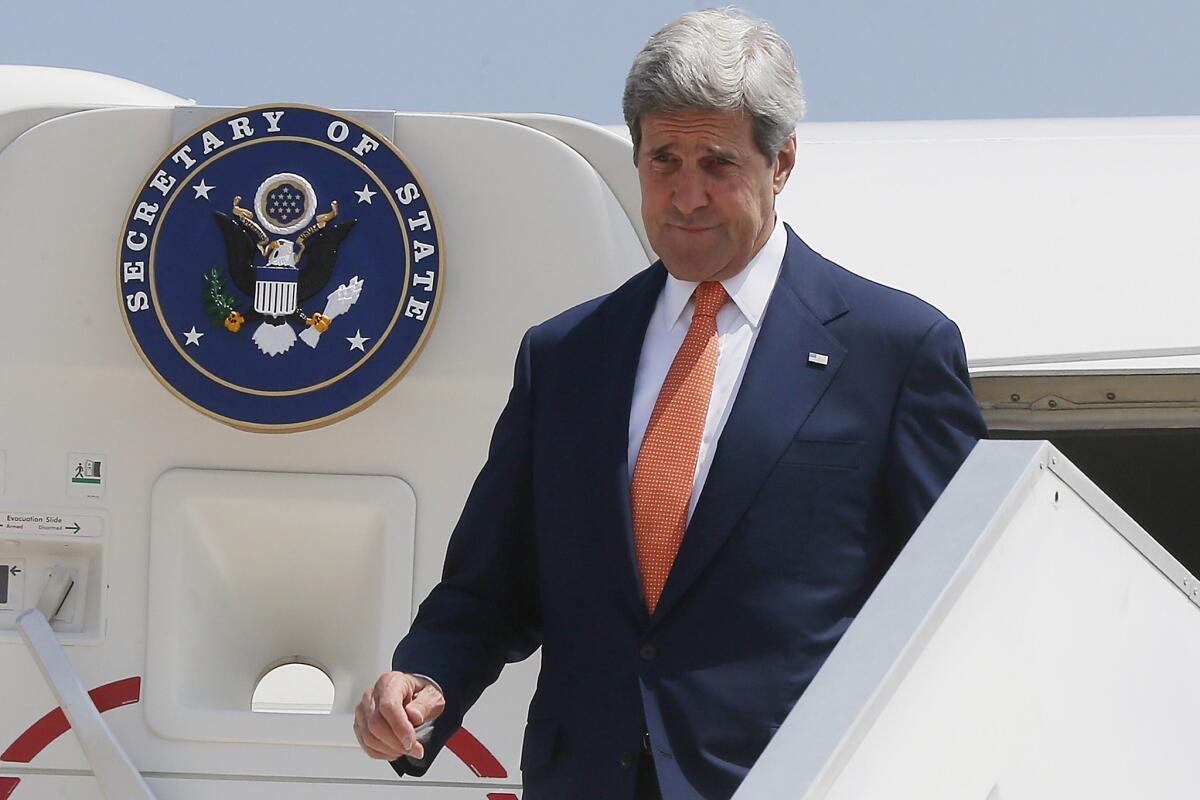Kerry arrives in Israel to push for Gaza cease-fire

- Share via
Reporting from Jerusalem — Following talks in Cairo, U.S. Secretary of State John F. Kerry landed in Tel Aviv on Wednesday for meetings with Israeli and Palestinian leaders in an effort to bring an end to days of bitter fighting between Israel and Gaza militants.
Kerry is scheduled to meet with Israeli Prime Minister Benjamin Netanyahu and Palestinian Authority President Mahmoud Abbas. Meeting with United Nations Secretary-General Ban Ki-moon in Jerusalem, Kerry said there have been “some steps forward” in bringing about a cease-fire but that more diplomacy was needed.
Kerry’s arrival was announced only after he landed and came after the Federal Aviation Administration banned flights in and out of Israel’s Ben Gurion International Airport on Tuesday, hours after a rocket landed in a community several miles away.
At the same time as Kerry’s arrival, Israeli Transportation Minister Yisrael Katz held a news conference at the airport, decrying the FAA decision.
“We regret the FAA’s decision. There was no reason to stop flights,” Katz said, adding that Ben Gurion Airport was an “entirely safe and secured” site.
Israel’s military continued heavy aerial bombardment and shelling of Gaza on Wednesday while ground forces scoured neighborhoods for the network of underground tunnels believed to harbor much of the military infrastructure of Hamas, the Islamic militant group that controls the Gaza Strip. Some of the tunnels extend into Israeli territory and have been used in cross-border attacks.
Israel’s military bombed the al-Wafa hospital in Gaza City on Wednesday, setting off massive explosions and sending thick smoke into the sky. According to army officials, militants have repeatedly used the hospital and its surroundings to launch rockets into Israel and fire on troops. Initial Palestinian reports indicated that civilians had been evacuated from the hospital following repeated warnings and a series of smaller strikes in recent days.
In Israel, officials said a foreign national was killed by a mortar fired from Gaza while working in the fields of a community bordering the region. Rockets were intercepted en route to the southern Israeli cities of Beersheba and Ashdod, the officials said.
More than 600 Palestinians have been killed and about 4,000 more have been injured since Israel launched its military offensive to curb rocket fire from the Gaza Strip. Most of the casualties are civilians. Thirty Israelis have died in the conflict, mostly soldiers killed in combat since Israel’s military entered Gaza with ground troops last week.
In Jerusalem, an estimated 30,000 people paid respects to Los Angeles native Max Steinberg, an Israeli soldier killed in Gaza on Sunday and buried in Jerusalem on Wednesday.
On Wednesday, the United Nations Human Rights Council convened in Geneva for an emergency discussion of the crisis, voicing concerns that Israel had committed war crimes.
A group of 12 Israeli rights organizations urged Defense Minister Moshe Yaalon to fulfill the country’s obligations under international humanitarian law, ensuring that Gaza’s humanitarian needs are met and preventing further disaster in an area already suffering an acute shortage of water and electricity.
Hamas has made a cease-fire conditional upon Israel opening Gaza’s border crossings and lifting the blockade that has isolated and impoverished the coastal enclave. Israeli officials have rejected Hamas’ conditions as unacceptable, and said they are not considering a cease-fire before the country’s military goals are reached.
The recent crisis is the third round of fighting between Israel and Hamas-controlled Gaza in five years. Increasingly, the sides seem unable to reach the agreements that ended the last military offensive in November 2012.
“The violence must stop and we must immediately start dialogue ... we don’t have time to lose,” The U.N’s Ban said in Jerusalem on Wednesday during a meeting with Israeli President Shimon Peres. On Tuesday, Ban urged the sides to tackle the problem so that “we are not back to the same situation in another six months or a year.” Before arriving in Israel, Kerry said “just reaching a cease-fire is not enough.”
Netanyahu has repeatedly said that any cease-fire must be followed up with a plan for a long-term demilitarization of Gaza, a position that seems to have received support from the European Union, which called Tuesday for Gaza militants to disarm.
Sobelman is a special correspondent.
More to Read
Sign up for Essential California
The most important California stories and recommendations in your inbox every morning.
You may occasionally receive promotional content from the Los Angeles Times.










